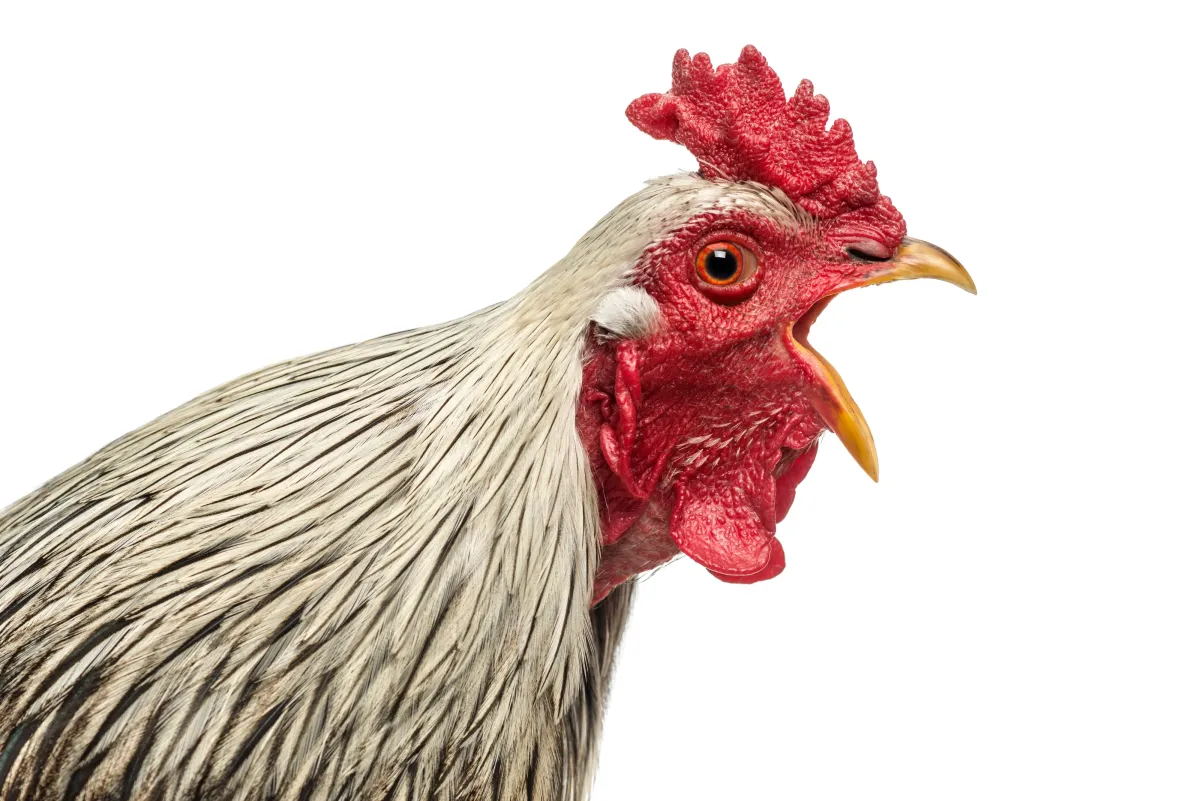Last Updated on January 28, 2024 by Fumipets
Decoding Clucks: Exploring Common Chicken Sounds and Their Meanings
Chickens are not only delightful companions in the backyard but also boast a rich vocabulary expressed through an array of unique sounds. From soft clucks to assertive squawks, each sound carries a specific meaning in the world of these feathered friends.
In this exploration, we dive into the fascinating realm of common chicken sounds and decode the messages behind each cluck, chirp, and crow.
Common Chicken Sounds and Their Meanings
Chickens are among the loudest creatures you can care for, whether you keep them as domesticated pets or farm animals. They maintain track of each other as a close-knit group by vocalizing their whereabouts. If they feel endangered, they may use their distinguishing noises to ask for aid or raise the alarm.
This collection of typical chicken noises was compiled to help you figure out what your hens are saying and how well they’re getting along.
10 Common Chicken Sounds and Their Meanings
1. Alarm
https://youtu.be/uB91GIgoEUI
You’ve undoubtedly heard your hens notify each other to the arrival of your four-legged best pals if you have a cat or a dog. Their alarm cries change according on the perceived danger level, so make a record of what each warning sounds like so you know when to check on your flock.
There are two distinct sounds to be aware of, and how your hens use them is determined by the danger they’ve identified, whether it’s a ground predator or a hawk flying above.
Ground Level Threat:
This cry consists of a succession of clucking sounds that are repeated. It’s fast-paced and noisy, and it might sound like cackling at times. Your hens will get noisier and more demanding as the danger approaches them, whether it’s your cat or a trespassing fox.
Air Raid Siren
Your hens will offer a significantly louder alarm to aerial predators like hawks. This cry has a siren-like quality to it. Your hens will flee in fear if they hear a loud shriek or scream.
You’ll most likely hear the alarm if you have a rooster, but dominant hens will also notify the others, particularly if you don’t have a rooster. There are times when roosters get too enthusiastic about sounding the alarm, often for no apparent cause. In this situation, your hens will begin to listen to other flock members rather than “the rooster who cried wolf.”
2. Broody Hen
Mothers of any species, even broody chickens, may be protective of their young. If you have a hen laying on a nest of eggs, she’s undoubtedly warned you against approaching too near a few times. Growls and hisses distinguish these sounds. Don’t be fooled into thinking that your hen just barks and doesn’t bite; she won’t hesitate to follow up her verbal warning with a stinging peck if you go too near.
Broody hens are the grumpiest birds you’ll ever meet, and it’s better to avoid them at all costs. Provide them with their own water and food dish so they don’t have to leave their eggs.
3. Chick Sounds
Chicks may make just as much noise as their adult flock companions, despite their fluffy appearance. While they don’t make as many sounds as fully grown chickens, they do make enough to keep you informed about their progress.
It’s up to you to make sure your chicks’ requirements are satisfied if you’re raising them apart from the rest of the flock and their mother, and knowing about the sounds they make will help you figure out what they need.
Happy
Chicks chirp to signify that they’re happy, much like their adult counterparts. It’s a cheery, gentle noise that will put a smile on anyone’s face.
Startled
Siblings, even chicken siblings, are likely to quarrel from time to time. You’ll hear a high-pitched, loud peep from the uninformed chick if one of the chicks creeps up on another and pecks them.
Distress
Chicks’ distress cheeping is similar to their content cheeping, but it’s louder in pitch, more repeated, and decidedly unpleasant sounding. When they’re hungry or cold, you’ll hear this anguish.
Fear
These peeps are high-pitched, repeated, and fast-paced noises that your chicks will produce if they are separated from their mother. As soon as they feel secure again, they’ll calm down.
Panic
This cheeping is similar to distress in that it is high-pitched and loud, but it is more persistent and frightening. This is their cry for assistance.
4. Contentment
A joyful muttering is the most typical sound you’ll hear from your hens. They’ll often do this when foraging to keep track of each other even if they stray off.
A faint, quiet warbling that some chicken owners regard as “purring” is another variant of these pleasant sounds. On bright, sunny days, chickens that are used to being handled will make this noise whenever you fuss over them, or during their dust baths.
5. Coop Noise
Chickens are gregarious animals that will greet each other and you in the morning and evening. When you open and close the coop, you’ll hear them talking to each other as they get ready for the day and as they go to sleep. When they get up in the mornings, they’ll be louder, and in the evenings, they’ll be quieter.
6. Crowing
Crowing is the most well-known sound made by chickens. The Roosters will begin the day with a loud “cock-a-doodle-do” and use the same cry throughout the day to proclaim their presence.
When there are many roosters in a flock, the dominant one always crows first, followed by the others. It’s your rooster’s method of establishing his dominance over the rest of the flock.
Hens have been found to crow in certain situations, although this is unusual.
7. Dinner Call
Roosters should look after their hens, which includes calling them over anytime he discovers food, whether it’s a log full of juicy bugs or food you’ve thrown out for them. To get the hens to come over, he’ll stand over the food and make a repeating clucking sound.
8. Egg Song
Hens, like roosters, make their own distinct crowing sounds. When they’re laying an egg or waiting to go inside their favored nest box, this is really noticeable.
The sound is a steady “buk-buk-buk ba-gwak,” and hens that are annoyed that one of their peers is dominating the nest box will be loud and persistent in their attempts to persuade the other to move aside. This plea is either heeded or rejected, depending on the hen’s position in the pecking order.
9. Mother Hens
If you let your brooding hen care for her eggs and chicks on her own, you’ll notice that she never stops chatting to them. She’ll start softly clucking to the eggs as soon as she begins incubating them, to get them acclimated to the sound of her voice, entice them out of their shells, and keep them out of mischief.
When hens discover food appropriate for their chicks to consume, they make the same dinner call as roosters.
10. Nesting Spot
Another technique for roosters to look after the hens in their flock is to build nesting areas. Before delivering their efforts to the hens, they’ll try their best to build the ideal nests, making a calm, concentrated clucking noise the whole time.
Frequently Asked Questions (FAQs)
Now that you’re aware of the typical sounds chickens make, you’re undoubtedly intrigued as to why they’re so talkative. So you can understand more about your hens’ routines, we’ve addressed a few commonly asked questions.
Why are my chickens so noisy?
Your hens will make noise no matter what breed you have. When they don’t make a sound, it’s much more worrying. This typically indicates that something is awry, such as a sickness or an accident.
Because that’s how your hens communicate, they’re loud. This is why forcing them to stay silent is a poor idea; their vocalizations alert each other when anything is amiss. It’s also why, because of how loud their crowing is, roosters are often prohibited from being kept near city borders.
Can I train my chickens to be quiet?
Although some individuals do educate their hens to be quiet, it is not advised. Chickens “speak” to warn each other of dangers and to ensure that they are aware of where the rest of their flock is, particularly while foraging.
There are quieter breeds, like Australorps, but even if they are a touch more reserved than Welsummers, they still share the same conversational behaviors.
Chickens are normally silent except when something is wrong with them. Even having a hen-only flock will only reduce the amount of noise they create by a little amount. There will be no irritating crowing from a rooster, but you will have to deal with the hens’ loud egg sings.
How do I learn what my chickens are saying?
Distinct breeds have different vocalization styles, but the basic sounds are all the same. Observing your hens and learning their language is the greatest approach to get acquainted with them. You’ll be able to figure out what each of their sounds implies if you pay attention to how they communicate and interact with one another.
Conclusion
To communicate with their flock, chickens produce a variety of sounds. They chirp, warble, and even purr. When you add in the loud warnings they give each other whenever they detect danger, the sounds they emit may become invasive and alarming.
Noisy fowl, on the other hand, are common. While certain varieties are quieter than others, they’re all chatterboxes, and even if you have a hen-only flock, you’re likely to hear complaints from your neighbors if you live in a city. Understanding the noises your hens make can help you decipher what they’re saying to one another and when they need your assistance to ward off a predator.
Questions and Answers on Common Chicken Sounds
What are some common sounds chickens make?
Chickens communicate through various sounds, including clucking, cackling, squawking, and crowing. Clucks are often associated with contentment, while cackles may signal excitement or alarm.
Why do chickens cluck?
Clucking is a versatile form of communication for chickens. Hens cluck to communicate with their chicks, express contentment while foraging, or even announce the satisfaction of laying an egg.
What does constant clucking indicate?
Constant clucking can signify distress or discomfort. Chickens may cluck persistently when feeling threatened, stressed, or if they are unwell. It’s essential to observe other behaviors to determine the cause.
Why do roosters crow?
Roosters crow to establish their territory and announce the beginning of a new day. Crowing also serves as a means of communication among roosters, asserting dominance and attracting hens.
How can chicken keepers understand and respond to chicken sounds?
Observing the context of the sounds is crucial. Familiarizing yourself with the different tones and pitches will help you understand whether your chickens are content, in distress, or signaling an exciting event. Responding appropriately, whether by providing comfort or investigating potential issues, strengthens the bond between chicken keepers and their flock.


















